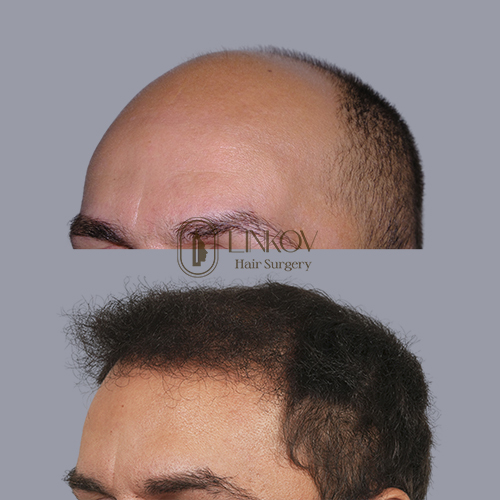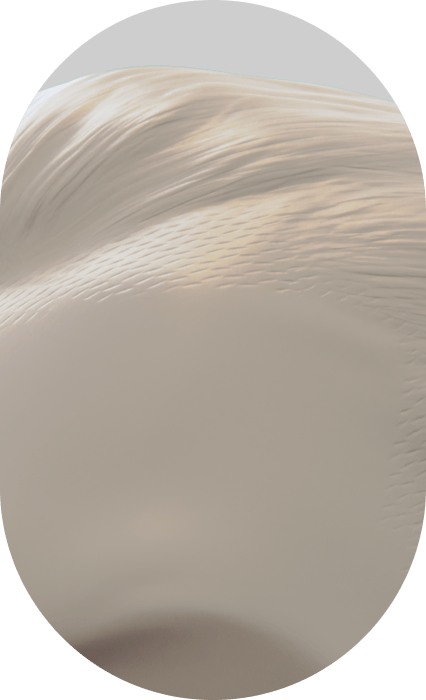Androgenetic Alopecia
Alopecia hair loss often attacks your self-esteem, as well as your image. And for too many, alopecia treatment seems out of reach. In New York City, though, you can get treatment for alopecia for the best price at Linkov Hair Surgery. If you’ve watched both male and female relatives lose their hair, there’s a decent chance that you may also develop androgenetic alopecia. In fact, if it’s genetic, there’s little you can do to prevent it. So, at the first signs of out-of-the-ordinary hair loss, call the top doctor in Manhattan and begin treatment to stop and maybe even reverse this inherited trait.

What Is Androgenetic Alopecia?
Androgenetic alopecia is a common type of hair loss in both men and women. Also known as pattern hair loss, this type of hair loss is hereditary and is characterized by hair being lost in a predictable pattern:
In male pattern baldness, symptoms usually start as a receding hairline, but the hair is gradually lost at the crown on top of the head, sometimes progressing to complete baldness.
In female pattern hair loss, the hair gradually gets thinner all over the scalp, often starting with a widening part through the hair. It rarely progresses to complete baldness, but can damage your sense of self.
The good news is that there are many different options available for treating alopecia, which is just the medical term for hair loss. These treatments slow or stop alopecia hair loss, and sometimes, they even regrow the hair. If you’re looking for the best hair transplant doctor in NYC for the treatment of androgenetic alopecia or other hair loss conditions, from alopecia areata to telogen effluvium, your best option is our hair restoration center.

What Causes Androgenetic Alopecia?
Hereditary hair loss is the most common type of hair loss. A family history of hair loss on either your father’s side or your mother’s side of the family increases your risk of developing this condition. Genetics, combined with several other factors, can lead to androgenetic alopecia. These factors include:
Aging Hair growth naturally slows as you age. While hair loss can happen at any age, signs of male or female pattern hair loss often start later in life as a result of changing hormones, so the risk of developing alopecia increases with age.
Hormones Androgens are hormones that regulate your hair growth and sex drive. Increased levels of androgens can lead to a shorter cycle of hair growth and a delay of new growth to replace the hair that you’ve shed.
Androgen receptor gene (AR gene) Variations of this gene impact the body’s response to androgens and set the stage for hair loss. It’s unclear how genetic changes related to the AR gene contribute to hair loss.
Race Hereditary hair loss is more common in Caucasians than those who are of African or Asian descent.
Other causes that are unrelated to heredity may also be a factor in the tendency to lose hair or experience thinning. These include:
- Medical conditions, such as lupus or diabetes
- Polycystic ovary syndrome (PCOS)
- Hormone imbalance
- Iron deficiency
- Thyroid imbalance
- Vitamin D deficiency
- Stress
Hair loss varies in severity, even when the cause is genetic. With progressive hair loss, your hair follicles, which are tiny cavities at the base of the hair strands, start to shrink, leading to decreased coverage of the scalp. New hair grows in shorter and finer until no new hairs grow at all.
What Medications Are Used for Alopecia Treatment?
While androgenetic alopecia can be frustrating and upsetting, it’s a treatable condition. Your hair loss can be slowed down and possibly even reversed. The top New York City hair loss specialists often recommend medication as the first option for alopecia treatment. Topical and oral medications that your doctor may recommend for alopecia hair loss include:
- Minoxidil Available under the brand name Rogaine, as well as in generic versions, minoxidil is a topical medication that can slow or stop hair loss. In some people, it stimulates the growth of fine new hair but can’t restore hair to its former thickness. It doesn’t work on anyone who’s completely bald.
- Finasteride This prescription oral medication may be used as a hair loss treatment for men. Doctors direct men with male pattern baldness to take it once a day to slow hair loss. It’s most effective when treatment is started soon after you first notice your hair loss.
- Spironolactone This anti-androgen drug may be prescribed as a hair loss treatment for women to slow hair loss. It’s sometimes recommended if treatment with minoxidil is unsuccessful, especially in women with PCOS.
These medications can deliver significant improvements in your overall appearance. Don’t expect results to show up right away; it may take several months to see a difference. Your Manhattan hair loss doctor determines the best medication for you based on your overall health, age, goals and expected results.

What Other Treatments Are Available for Alopecia?
Medications are effective for many people, but not everyone. Fortunately, there are several other treatments for alopecia that your doctor may suggest, including:
Microneedling This form of treatment is done by using multiple fine needles to create tiny punctures in the skin, prompting your body to release growth factors. This treatment may be combined with minoxidil or other modalities to stimulate hair growth.
Laser therapies Using a low-level laser device to treat hair loss improves the hair density in some people. This is another treatment that often works well in conjunction with other types of treatments.
Platelet-rich plasma (PRP) injections Platelets are blood components that, in a concentrated form, stimulate regeneration, similar to the way stem cell therapy works. A PRP procedure involves drawing a small amount of your blood and then concentrating the platelets in a centrifuge. The concentrated plasma is then injected into your scalp to slow hair loss and possibly encourage new growth.
Scalp micropigmentation Also known as a hair tattoo, this procedure is performed on your scalp to camouflage thinning areas
Hair transplants This surgical procedure involves moving hair follicles from a donor area, usually the back of your head, and implanting them in the area that needs more hair. It’s an effective and permanent solution.
People with androgenetic alopecia who prefer a non-medical solution may want to consider hair replacement systems. These include wigs and hairpieces with a natural look and a similar texture to your own hair. This form of treatment doesn’t slow hair loss or stimulate regrowth, but it can improve your self-esteem.
How Do I Know if I Have Androgenetic Alopecia?
If you’re noticing bald spots, areas of thinning or a receding hairline, you may have androgenetic alopecia. It’s natural to lose 50 to 100 hairs a day, but if you’re finding a larger than normal amount of hair in a hairbrush, it may be time to consider seeking help. Symptoms of male pattern baldness usually begin as the hairline takes on an M-shaped appearance.
Pattern hair loss in both men and women is a progressive condition, so when you notice a larger than normal amount of hair loss, it’s time to act. The sooner you start treatment, the better the results you’re likely to get, because without treatment, hair loss will continue. Get access to the top doctors in the field of hair loss for treatment at the best price, by contacting Linkov Hair Surgery today.
Linkov Hair Surgery
150 E 56th St, #1A
New York, NY 10022
(212) 970-9404

